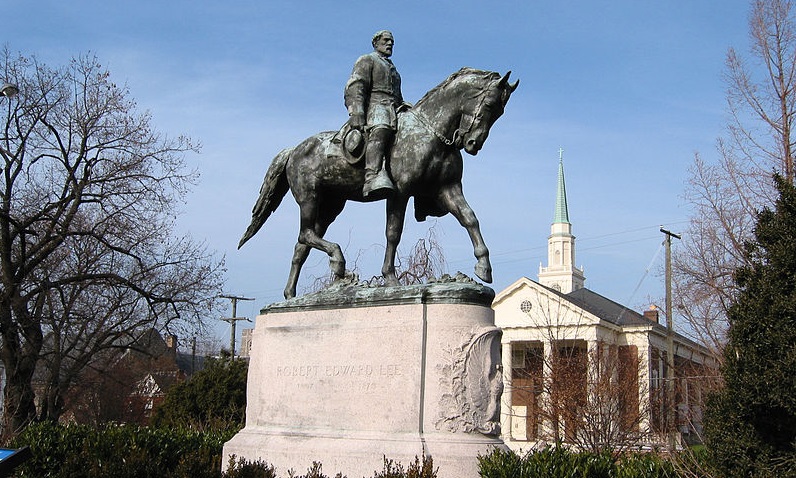Since November 2016’s presidential election, the United States has witnessed a sharp rise in violent demonstrations and protests, mainly by the American far-left groups. But what happened in Virginia recently seems to have taken the political divide in America to a whole new level of bitterness and controversy. The local administration had ordered the removal of a statue of Robert E. Lee—a confederate general of the Civil War—leading to a protest by what the mainstream media described as “white nationalists” and then violent clashes with (what the media called) counter-protesters, i.e. leftist groups that wanted the statue removed.
What’s the social, psychological, and political implications of removal of monuments and the increasing intolerance across the political divide? This correspondence with two Americans, both my friends and fellow writers, with good analytical skills attempts to get some insight into this issue. Let me introduce the participants first.
Dave Scotese is the volunteer webmaster for voluntaryist.com. He promotes curiosity and innocence in an effort to delegitimize the idea that punishment is an effective strategy for social cohesion. He recognizes that many people are taught at a very young age that punishment is the best way to maintain order, and he believes this teaching is flawed. He urges that publication and dialog be used in place of man-made suffering so that peaceful peer pressure can take over as the engine of social cooperation. He writes about these things and lots of geeky tech stuff (but not too much!) at http://litmocracy.blogspot.com.
Dwight Schwab is a national political and foreign affairs columnist for newsblaze.com, formerly with examiner.com (2009 – 2016) and an author of two books, Redistribution of Common Sense – Selected Commentaries on the Obama Administration (2009-2014) and The Game Changer – The Most Stunning Election in History (2017). His entire profile can be found on Google at “Dwight L. Schwab, Jr.”

Ernest: First, I thank you both for joining this chat. Let me ask first how did you receive what happened in Charlottesville on August 12? Was it a surprise to you to see things going that far?
Dwight: No surprise in the least. The Democratic Party has been taken over by the far left that has no message other than “I hate Trump.” Their bench of possible presidential contenders is limited to liberal politicians with little change of national success from the positions and policies they have put their party in. Donald Trump has specific issues that resonate with a base of Americans in this country. Meanwhile, the Democrats cling to the ideology of racial divide and victimization. It is not traditional America and the message is dividing an already divided and isolated party. In short, there is no resonating message.
Dave: It was not a surprise to me. I have been listening to the “School Sucks” podcast in which Brett described something happening on college campuses. It seems to me that there is a strong interest in getting people riled up, and the “Unite the Right” rally simply presented those interested in such riling up with an opportunity to do so. Someone, I suspect, is interested in increasing the violence and frustration being expressed by Americans. I believe this tactic is a response to the increasingly sophisticated and disciplined work done by libertarian-minded people to push for an abandonment of politics, and an approach to dialog and honesty. I have expected increased spectacles of violence in the media since Ron Paul’s message was buried by whatever the mainstream media could get its hands on. The powers that be are ever more desperate for a reason to continue controlling us. Richard Grove has documented evidence from government agents showing that for many years, ploys have been hatched by intelligence agencies to create the façade of terrorism. He started with this: https://unitedresistance911.wordpress.com/9-11-politics/richard-grove/.
Ernest: To each of you, what do you think is the nature of this issue with confederate monuments? Is it really a problem having statues or other memorabilia of the confederate side of the Civil War times?
Dave: The issue is that a monument is highly visible and works as a good focal point for people who want to highlight an issue. While it’s true that Robert E. Lee fought for the Confederate side in the War Between the States, Abraham Lincoln said he didn’t really care about slavery. The south was fighting as much for the right to be left alone as it was for the right to exploit the slave trade (which was dying anyway) and its unfair tariff burden. The world was already waking up to the fact that mistreating people produces worse results than treating them with respect. We still haven’t learned that lesson fully. Everyone in the United States now bears an unfair tax burden. Some say that we have all become slaves.
Dwight: The left looks at America as an evil-doer of evil things. Beginning with Obama, they apologize for America being bigger and stronger than the rest of the world. Their idea of globalization is not an American principle and without the support of a majority, they resort to defacing and devaluing American history, culture, and ideas. It will never gain traction in my lifetime.
Ernest: Dwight, as a commentator on the US political issues, do you see this kind of activism by the left as an ongoing reaction to Hillary Clinton’s loss in the 2016 election?
Dwight: It is the main reason for their actions. Combine that with people like billionaire terrorist George Soros who backs groups like Black Lives Matter and Move On, and you have a group of disheartened present-day hippies yearning for the world that will never be in a capitalistic society like America; unless the people allow it.
Ernest: When monuments come under attack, whether by the administration or by activists on the street, does it indicate an intolerance of symbols of the past? I say symbols because that is what monuments represent of any part of the past.
Dave: I think we have to take into account the attacker and his or her worldview more than the object they attack. Anyone who attacks a symbol has something to say and doesn’t feel that they have a voice adequate to say it forcefully enough to make the difference they want to make. This is the nature of violence, against people or things or even communications—that those utilizing the violence feel they won’t be heard if they communicate simply and honestly. This feeling of inadequacy is learned and I am a stand for working to make it a bad lesson. Let us gently challenge those who claim that the time for talk is over. Let those with ears use them, and those with voices use them, and those with arms lay them down in an effort to understand the dialog.
Ernest: Islamist radical groups have destroyed monuments in the past, most notably the Taliban who destroyed the historical Buddha statues in Afghanistan in 2001, invoking protests from the international community. Do you see a similarity of mindset in the left’s attacks on confederate statutes or monuments in America in 2017?
Dwight: My only response is: Mussolini, Mao, Stalin, Hitler, Pol Pot, Kim Jung In. Shall I continue with these closed and totalitarian societies? We have centuries of it.
Dave: I have never really gotten a good sense of the mindset of the Taliban leaders who decided to destroy statues of Buddha, so I can’t compare said unknown mindset to the one I believe to be that of the left, or whoever it was that attacked confederate statues. I can imagine that both groups sought to show disdain for a popular symbol of a pattern of thought they wished to be diminished, and that would indicate a similarity of mindset. I have a very limited view of these things because I am very much prone to view whatever comes to my attention through the mainstream media as highly contrived and manipulative, so I don’t pay much attention to it. It feels very much like the bread and circuses used by the Romans to cure the “detestable vice” called “compassion” – according to Amy Scanlon (as quoted by William Astore at www.huffingtonpost.com/william-astore/bread-and-circuses-in-rom_b_3414248.html). I would not like to be so “cured,” so I ignore the mainstream media for the most part.
Ernest: Dave, do you feel this issue of clashing over history works to distract public attention from something equally or more important that does not find enough or any space in media?
Dave: Absolutely. Do we want peace and prosperity? Do we want to cooperate within our own borders, and also across them? Do we want people to be able to work together and trade with each other regardless of how they look, what they wear, or what religion they believe in? How do we get these things? We have to stop lashing out and start talking, paying attention, understanding that nearly everyone on the planet wants peace and prosperity. Who doesn’t? The makers of munitions and the technologies that destroy, “defense” contractors, and especially the banks that lend money to governments who find the money to pay back those loans by squeezing their citizens. Racking up government debt in any way, shape, or form, works as the main sustenance for international banks. The issue has been the same for thousands of years: power corrupts, and absolute power corrupts absolutely. The internet and cellphones and Vimeo (sorry, YouTube, you censor too much) are rapidly making people aware that brutality just increases our debt to bankers without much in the way of improvement. We are finding peace without our governments, and they are desperate to deceive us back into relying on them.
Ernest: Do you guys think allowing the destruction of confederate monuments, whether in form of removal by local governments or by unlawful attacks of civilians, can set a precedent of destruction of anything history, any symbols or works that either side finds offensive?
Dwight: The destruction of Confederate monuments is part of a voting drive with minorities for the left. By making this country into groups of victims, the past becomes a politically correct way of using that as a tool. For many blacks and ethnic groups who can’t see past the steering wheel, removing what they have been told is oppression and slavery is a big plus for the pious left. They are supposed to be the compassionate and tolerant among us, but they are the exact opposite. If you do not agree with their victimization program and identity politics to split the country apart, you are the enemy. This is their way of recruiting the newest among us and the uneducated willing to listen to this diatribe. Unless Americans stop tuning in, they will attract enough gullible people to make this an ever-lasting problem.
Dave: You’ve combined “removal by government” and “unlawful attacks” into a single representation, “allowing”. That which is unlawful is, by definition not allowed. Perhaps, by “allow” you mean to keep silent where one might have the opportunity to speak against something. Many people spoke against it as far as I know, but was it worth their time? I doubt it.
The percent of the audience that looks askance at what is presented in the media, who are motivated to skepticism instead of agreement, who think about what is presented instead of simply accepting the claims of the presenter – that percentage is growing. However, you’re right to worry that we are in danger of losing that which offends, and the tremendous value that it offers. Thaddeus Russell wrote a history book, The Renegade History of the United States, which, I believe, does a very good job of preserving and highlighting that value. Instead of protesting the destruction of inanimate objects, read a copy of Russell’s book and then share it with someone.
Ernest: How do you see the role of the mainstream media in all this conflict?
Dwight: The mainstream (extreme) media is the left arm of the Democratic Party. It is considered politically correct to be to the left straight t out of left-wing journalism schools. The pressure is on in 90 percent of media outlets to walk in goosestep with the left if you want employment. Otherwise, you will be shouted down and left to find work elsewhere. It is a lemming call that cannot sustain unless Americans do not bother to refute this so-called ideology. It will deepen with time as more and more universities buckle under to the threats from the left; you know, the tolerant among us.
Dave: The proper role is to identify and describe the parties that find themselves in conflict and present an objective view of their claims and concerns. The actual role is cheerleader for various interests, and since I ignore most of it, I can only guess what those interests are: more government control? Gun bans? Disrespect for rational discourse? Get more people to pick a side and fight with their closest friends and family who happened to pick the other side. A divided nation is easier to control. Sorry my cynicism is showing a little.
Ernest: So to conclude this correspondence, what do you guys think is the right course of action to follow? Should the local governments be entitled to decide whatever they want to do with any monuments or just leave the monuments alone and focus on bigger issues?
Dwight: The monuments are nothing than more than the next step of chance. Like Hitler in the ‘30s, he tested the will of the western powers to see how far he could go before all-out war. They will continue to creep along breaking down American traditions like Hitler with the Munich Agreement of 1938. That is until there is that one step too far which will awaken Americans to their freedoms and history being taken from them by a bunch of rabble-rousing, no-think morons who only thirst for power on an agenda that isn’t one at all aside from public anarchy. The pressure should be on their media helpers who fuel this outrageous, anti-social behavior. Will we see an end to this as Poland brought WW II to us in September 1939, 78-years ago?
Dave: You’re asking an anarchist what the proper role of a ruling body is in the context of a struggle to manipulate people. When you’re ruling other people, your proper course is to stop it and leave them with the best guidelines for learning to develop and obey their own conscience. Since these local governments likely hold the title to some of the monuments (and plenty of other stuff), they could auction off the properties and divide the proceeds of the sale between the taxpayers from whom they’ve been stealing.
A local government could actually become a principled charity of sorts, developing guidelines for the local population and soliciting donations so that they can continue studying society and proposing guidelines and keeping the population informed in whatever way they see fit. It could be very easy since so many people feel that “government” is necessary. Then again, a lot of those people feel that law enforcement and the punishment of “criminals” both require a significant amount of brutality, and they’d be out of luck.
Ernest: Dave and Dwight, thank you again for sharing your thoughts here on this issue.


